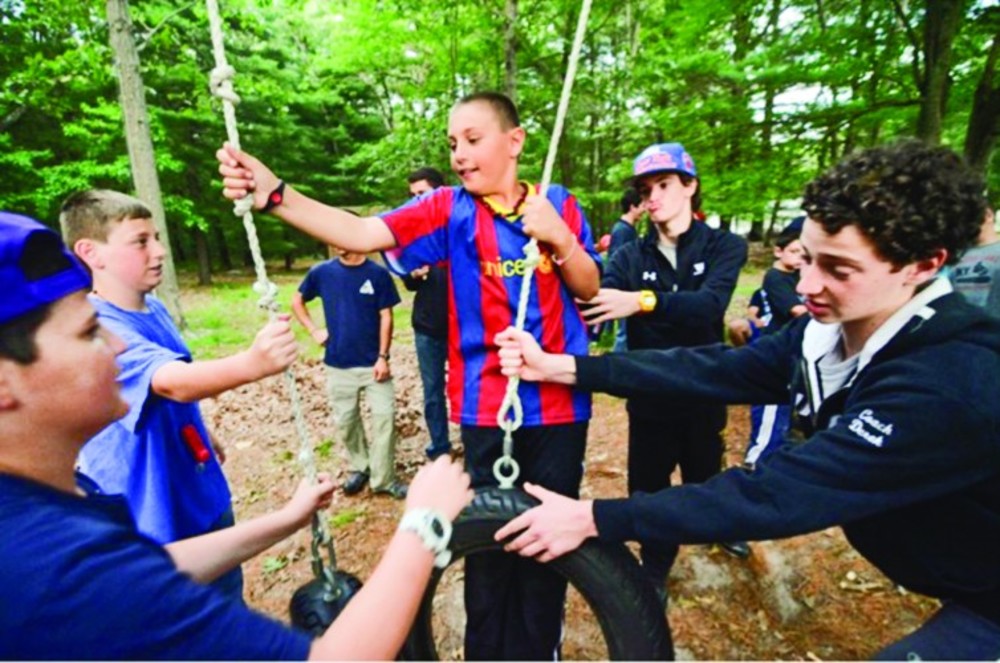Jewish overnight camps create a long-lasting sense of community and belonging
 JORI campers try out the ropes course.
JORI campers try out the ropes course.
According to a 2014 survey from the Pew Forum, 70.6 percent of the American population identifies as some type of Christian or Catholic. Of the remaining 29.4 percent, 1.9 percent identify as Jewish. That means that for every 100 random people in a room, theoretically approximately two people should be Jewish. It’s easy to see how a young Jewish child might sometimes feel left out.
However, help arrives in the form of Jewish overnight camps.
Jewish summer camps bring kids together to learn about Judaism in environments that promote fun, learning and making friends. And while we often have these resources available at home in the form of religious day schools, after-school religious education programs, and other forms, learning is understandably more fun when the promise of swimming or sailing is part of the deal. Jewish summer camp is often even more mesmerizing for young ones when there is not only a promise to spend a long time away from mom and dad, but the idea is to spend some time in a completely new place – that is to say, embarking on an adventure of sorts.
For many young Jewish people, summer camp was important because it made them feel a part of a community where they weren’t the minority. Such was the case for 24-year-old Arielle Cohen of North Attleboro, Massachusetts.
“Normally as a Reconstructionist Jewish youth I was in the minority. Camp was a place that brought the minority from across the country and made us a majority,” says Cohen. She continues that it was “very empowering to be with like-minded but also very diverse youth.”
This was a sentiment echoed by others – the opportunity to be a part of a community where their Jewish identity didn’t deem them a minority. Twenty-five-year-old Valerie Glassman, who lived in Norton, Massachusetts, before traveling in South America last year, valued “seeing the different ways Judaism is celebrated throughout the U.S.” At a time when the Israeli government has started embracing Judaism in all its forms, the idea that there is more than one way to be a good practitioner of Judaism is an important one to impart to children.
For 24-year-old Micah Levine of Burlington, Massachusetts, going away to summer camp was also a first chance “to try out being independent from my parents at a young age in a safe environment.” Levine is not alone; for many young people, living away from mom and dad for a short period of time can have positive effects on their character development. An article in Psychology Today even notes that summer camps can make children more resilient in adulthood, as summer camps allow campers to “[take a] manageable amount of risks without a parent following after you.”
One of these risks is homesickness. Homesickness is especially common in first-time campers, and something many people who go away to camp mention. However, 27-year-old Randy Oster of Stamford, Connecticut, provides a silver lining to undergoing this phenomenon. “The good part of this was that you were already in an incredibly supportive community where everyone understood and were ready to help when those feelings came up,” he says.
And then there are campers who don’t catch homesickness at all – the pure bliss of free and independent living stamps out any yearning for the comforts of home. Glassman was one of those campers.
“I wasn’t homesick,” she recalls, “I actually loved being away from home.” Not to worry though – it doesn’t necessarily mean they have forgotten about you. Glassman cited one of the benefits of overnight camp as “being away from family long enough to appreciate them a bit more.”
Once campers do return home to the wide-open arms of their parents, though, the question arises of what to do with the friendships you’ve made. Especially in a camp that draws kids from around the country, what do you do when it’s time to go home?
Social media, Oster says, has helped.
“Social media helped us all stay in touch until we could see each other again,” says Oster, “but it was difficult not seeing all of the friends that I lived with and made such strong connections with during each session at camp.”
The effects of summer camp can even last into adulthood. Cohen mentioned the ability to call on a network of summer camp friends when you’re older and traveling around the country, and Oster attributes going away to summer camp to kick-starting his desire for travel.He has since lived in Israel and traveled around Central America. These are only a few ways that summer camp positively affects child development.
The American Camp Association points out that camp is one of the few institutions that not only encourages physical activity and creative expression – which is important as physical education and arts classes are being cut more and more from school curriculums around the country – but also fosters a real sense of community. And community is timeless and always worthy of pursuit.
ARIEL BROTHMAN is a freelance writer who lives in Wrentham, Massachusetts.







